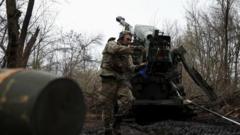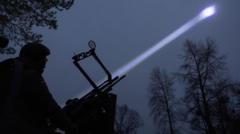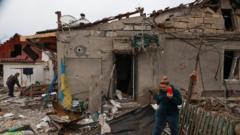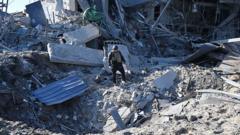Amid ongoing conflict in Ukraine, recent attempts at a ceasefire have been marred by historical failures and a lack of trust between Kyiv and Moscow, complicating meaningful progress in negotiations.
Ceasefire in Ukraine: Historical Distrust Stalls Peace Efforts

Ceasefire in Ukraine: Historical Distrust Stalls Peace Efforts
In a war scarred by failed agreements, any attempt for a ceasefire faces deep-rooted skepticism from both sides.
Recent attempts to secure a ceasefire in Ukraine serve as a stark reminder of the challenges posed by years of failed agreements and mutual distrust. Russia's latest ceasefire during Easter, lasting a mere 30 hours, prompted accusations of violations from both sides, highlighting the tenuous nature of any pause in hostilities. While Ukrainian President Volodymyr Zelensky expressed hope that this truce could be extended, the history of mistrust—rooted in Russia's annexation of Crimea and ongoing aggression since 2014—continues to shadow peace efforts.
The United States had previously sought a longer, month-long ceasefire, but past experiences fall heavily on both parties. Russia's insistence on various conditions, including the cessation of Ukraine's military recruitment and arms buildup, demonstrates its unwillingness to engage in de-escalation without achieving its strategic goals. This includes a demilitarized Ukraine and guarantees against NATO expansion.
The credibility of ceasefire agreements has been severely undermined, with Ukraine accusing Russia of violating 25 truce agreements since the onset of hostilities. Critics argue that Russia’s past behavior suggests that its commitment to ceasefire talks is insincere, while Ukraine, too, bears a share of the blame for infractions.
Looking back, the Minsk agreements of 2014 and 2015 were designed to stabilize the conflict but fell apart almost immediately, with reports of violations surfacing within minutes. Subsequent truces, often labeled as “Easter,” “Christmas,” or “school ceasefires,” became infamous for their brief and ineffective durations. The chaotic nature of these efforts illustrates the fundamental challenges of establishing and maintaining trust in negotiations, compounded by the ongoing military threats perceived by Ukraine.
In reflecting on these failures, geopolitical analysts suggest that until significant diplomatic measures and security guarantees are put into place, the cycle of violence and broken promises is likely to continue. As calls for an unconditional ceasefire by the US remain unheeded, observers are left to ponder if any negotiated peace could emerge from the ashes of prolonged conflict.




















